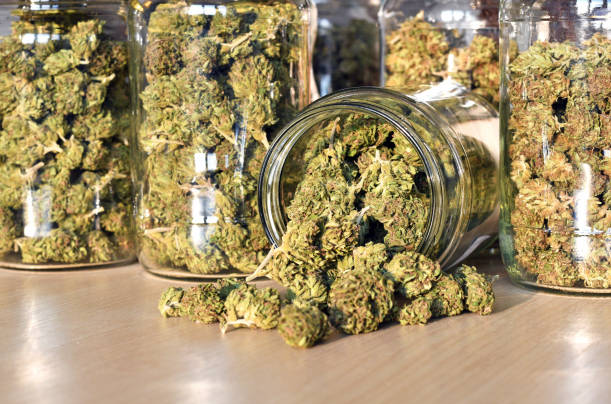
Ohio’s marijuana prices are already among the highest in the region – more than double those in neighboring Michigan – but state lawmakers are pushing for policies that could make cannabis even more expensive and less potent. For Terrell Washington, access to marijuana was life-changing. Diagnosed with Crohn’s disease as a child, he struggled with symptoms until he turned to cannabis. “It got me off of medication and into remission,” Washington said. Motivated by his own experience, he founded Leaf Relief, a dispensary serving both medical patients and recreational users.

Legislative Push to Amend Marijuana Laws
However, Washington now fears for his business as Ohio legislators move to tighten cannabis regulations. House Speaker Matt Huffman (R-Lima) has been vocal about his concerns regarding the impact of marijuana legalization. “When we legalized marijuana, there were a whole group of societal problems that were created by that,” Huffman stated.
Ohio voters decisively approved Issue 2 in November 2023, legalizing cannabis for adults 21 and older. The measure allows individuals to grow up to six plants, with a household cap of 12. Dispensaries have been selling recreational cannabis since August 6, 2024. But lawmakers, particularly Republicans, have sought to amend the law. Senate Bill 56, introduced recently, proposes multiple changes, including reducing the allowable THC content in products and cutting the home-grow limit from 12 plants to six.
“We’re trying to move it [to be] a little bit more reasonable – continue to have adult use, but a little bit more reasonable usage,” said state Sen. Steve Huffman (R-Tipp City), the bill’s sponsor and a cousin of the House speaker. A physician, Steve Huffman has played a key role in shaping Ohio’s marijuana policies.
Under the proposed legislation, THC levels in edibles would be capped at 100 milligrams per package—significantly lower than many products currently on the market. Additionally, THC potency in adult-use extracts would be reduced from 90% to 70%.
Increased Taxes and Economic Impact
The bill also includes a tax hike. The current 10% tax at the point of sale would rise to 15% under the GOP proposal, while Gov. Mike DeWine has suggested increasing it to 20%. “[This money] could be spent on things that we thought would really make a difference, and frankly, wouldn’t get done but for using that money in the marijuana,” DeWine argued.
Reporters asked Washington if this would price out customers. “One hundred percent,” he replied. “It’s going to hurt dispensaries, cultivators, and processors across the state because it’s going to push people to the black market.”
When asked if he believed this would push people to the less expensive, close option of Michigan’s market, Washington responded with the following: “One hundred percent. I don’t know why we’re no longer being pro-business when it comes to cannabis. We tout ourselves as being pro-business, pro-Ohioans in every other sector, but here — we just try and regulate the industry into the ground, which seems to abandon the traditional beliefs of the party who’s making it.”
Michigan’s significantly lower cannabis prices already make it an attractive alternative. Data from each state’s regulatory division shows that as of January, marijuana in Ohio cost approximately $192 per ounce, compared to just $84 in Michigan. The per-gram price difference is also stark: nearly $7 in Ohio versus $3 in Michigan.
Redirecting Cannabis Tax Revenue
Another controversial element of the bill is how it reallocates cannabis tax revenue. Under Issue 2, funds were designated for specific areas, including substance abuse programs, social equity initiatives, and local governments. However, the proposed legislation would funnel all tax revenue into the state’s General Revenue Fund, giving lawmakers discretion over its allocation.
Senate leaders argue that voters may not have fully understood the implications of Issue 2 when casting their ballots. Washington believes this undermines voter intent. “I think that is a perfect example of some leaders’ arrogance and disrespect for their own constituents,” he responded.
Next Steps in the Legislative Process
Senate Bill 56 could be voted out of committee as early as Wednesday, potentially moving to the Senate floor before heading to the House. Speaker Huffman, who initially advocated for sweeping changes to the law, appears to be reconsidering some restrictions following discussions with lawmakers more familiar with cannabis policy.
State Rep. Jamie Callender (R-Concord), who previously blocked Huffman’s proposed rollbacks, has been meeting with him to provide insight into the industry and existing regulations. Callender remains cautiously optimistic that upcoming changes will focus on refining hemp product regulations and aligning medical marijuana THC limits with recreational standards.
Despite these discussions, many dispensary owners remain concerned. Washington urged Ohioans to engage with lawmakers in a statement, “I would encourage all Ohioans, because this affects all Ohioans, to urge the politicians to put local municipalities and Ohioans first – and not their ego.”